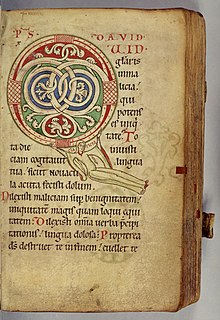Psalm 52
| Psalm 52 | |
|---|---|
 Claricia's Psalter, start of Psalm 52 | |
| Other name |
|
| Text | Attributed to King David |
| Language | Hebrew (original) |
Psalm 52 is the 52nd psalm from the Book of Psalms. It is described as a Maskil,[1] attributed to David, and is said to have been written "when Doeg the Edomite went and told Saul, and said to him, "David has gone to the house of Ahimelech".[2] In this psalm, David criticises those who use their talents for evil.[3] In the slightly different numbering system used in the Greek Septuagint (LXX) and Latin Vulgate translations of the Bible, this psalm is Psalm 51.
Context[]
The psalm's sub-heading refers to the occasion reported in 1 Samuel 21-22 when Doeg, the chief herdsman of Saul, King of Israel, informed Saul that David had been received by Ahimelech at Nob, a priestly town in the vicinity of Jerusalem, and assisted with the means for his flight. Alexander Kirkpatrick observes that "the character denounced in the Psalm is in some respects such as we may suppose Doeg to have been. He was a man of wealth and importance as the chief of Saul’s herdmen (or, according to the LXX, the keeper of his mules). His tongue was "a deceitful tongue", because although the facts he reported were true, he helped to confirm Saul in a false and cruel suspicion.[4]
However, Kirkpatrick notes that
the entire absence of any reference to the cold-blooded and sacrilegious murder of the priests at Nob, in which Doeg acted as Saul’s agent, when all his other officers shrank from executing his brutal order, makes it difficult, if not impossible, to suppose that the Psalm was really written by David on that occasion, unless we could assume that it was composed after Doeg’s information was given but before the massacre was perpetrated, which is wholly improbable.[4]
Instead, he argues that
Just sufficient appropriateness may be traced to account for the title having been prefixed by the compiler of this division of the Psalter, or for the Psalm having been connected with the story of Doeg in some historical work from which the compiler took it.[4]
Latin divisions[]
This psalm opens the second section of the three traditional divisions of the Latin psalter, and for this reason the first words (Quid gloriatur in malitia qui potens est iniquitate...), and above all the initial "Q", were often greatly enlarged in illuminated manuscript psalters, following the pattern of the Beatus initials at the start of Psalm 1, and the "D" of Psalm 102.[5]
Psalm Form[]
According to Hermann Gunkel's system of classification, Psalm 52 was conditionally classified as an Individual Psalm of Trust, one that demonstrates an expression of trust or confidence in YHWH's assistant to the petitioner.[6]
Book of Common Prayer[]
In the Church of England's Book of Common Prayer, this psalm is appointed to be read on the morning of the tenth day of the month.[7]
References[]
- ^ Psalm heading to Psalm 52 in the New International Version
- ^ Psalm heading to Psalm 52 in the New King James Version
- ^ The Artscroll Tehillim, page 110
- ^ a b c Kirkpatrick, A. (1906), Cambridge Bible for Schools and Colleges on Psalm 52, accessed 21 November 2021
- ^ Calkins, Robert G. Illuminated Books of the Middle Ages, p. 208, 1983, Cornell University Press, ISBN 0500233756
- ^ Coogan, Michael D. (2011). The Old Testament: A Historical and Literary Introduction to the Hebrew Testament. Oxford: Oxford University Press. p. 453. ISBN 978-0-19-537840-5.
- ^ Church of England, Book of Common Prayer: The Psalter as printed by John Baskerville in 1762, pp. 196ff
External links[]
| Wikimedia Commons has media related to Psalm 52. |
- Psalms
- Works attributed to David